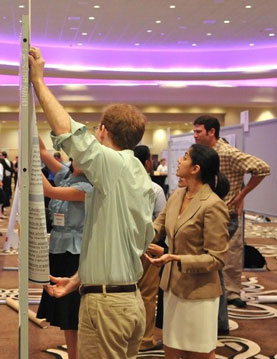Research at SGIM meeting targets prevention
From smoking to weight loss to vaccination, much of the research at the Society for General Internal Medicine annual meeting focused on preventive medicine. Researchers from around the country shared data on their efforts to keep patients healthy.
MIAMI—From smoking to weight loss to vaccination, much of the research at the Society for General Internal Medicine (SGIM) annual meeting focused on preventive medicine. Researchers from around the country came to the gathering in May and shared data on their efforts to keep patients healthy.
Paying patients to change

Kevin Volpp, ACP Member, of the University of Pennsylvania, has become known for his unusual approach to this effort—paying patients to engage in healthful behaviors. He reported data from two new trials, one an effort to improve blood pressure control and the other a study of smoking cessation.
The first study included 479 Veterans Affairs patients who had poorly controlled blood pressure. Prior research has shown that increasing medication copayments lowers patient compliance, so Dr. Volpp and colleagues decided to see if the opposite was true, too. If copays were reduced or eliminated through a reward system, would patients be more likely to take their drugs?
At least in this study, the answer is no. The rewards had no effect on patients' blood pressure, apparently indicating that the gain of free medication was not sufficient motivation for the patients to change their behavior. “We know that people are much more susceptible to losses than they are to gains,” Dr. Volpp said. However, he emphasized that changes in copayments may be very context-specific, so it is conceivable that different studies may find different results.
Financial incentives do work to get people to quit smoking, Dr. Volpp has found in prior research, published in the New England Journal of Medicine in February 2009. But in his new analysis, he wanted to see whether patients who weren't able to quit at least smoked less because of the incentives.
No again. “The incentives really help people quit. If they didn't quit, it didn't really have any effect,” Dr. Volpp said.
Given that the incentive programs only provide benefit in patients who succeed in totally quitting smoking, Dr. Volpp also looked at ways to identify those people. He found, not surprisingly, that patients who are least concerned about the future are most likely to respond to the immediate incentives.
But targeting those patient groups with incentive programs would have its associated challenges, he noted. “You're only eligible if you're somebody who ignores the future. Is that the message we want to send?” Dr. Volpp asked.
Medicare issues, part 1
Misaligned financial incentives also appear to be a problem in the Medicare program, according to another study presented at the SGIM meeting. John M. McWilliams, ACP Member, from Harvard, presented data on spending differences between people who had health insurance before they became Medicare-eligible and those who didn't.
The previously uninsured patients incurred significantly higher costs in home health care and hospitalizations, Dr. McWilliams reported. Much of the money was spent on complications from cardiovascular disease and diabetes and joint replacements—expenses that potentially could have been prevented with earlier interventions.
The researchers calculated that although expanding Medicare to cover people beginning at age 51 would cost an additional $197 billion, it could potentially save $98 billion in health costs by avoiding this post-enrollment spending bump. “Expanding coverage to patients 51 to 65 is likely to be a valuable investment for the United States,” Dr. McWilliams said.
Medicare issues, part 2
Medicare coverage was also the main problem uncovered in a study of physician attitudes regarding the herpes zoster vaccine, presented by Laura P. Hurley, ACP Member, of the University of Colorado at Denver.
Dr. Hurley surveyed members of ACP and the American Academy of Family Physicians about their use and knowledge of the zoster vaccine, the first vaccine to be covered under Medicare Part D. Out of the almost 600 respondents, only 51% said that they stock the vaccine and only 41% strongly recommend vaccination to eligible patients. That's compared with 96% who strongly recommend flu vaccination.
The top reasons for not pushing the vaccine were all money-related: concerns about the cost for patients, the upfront cost to buy the vaccine, and the level and difficulty of reimbursement. Reimbursement is so complicated, in fact, that 57% of the physicians reported asking their patients to check on their own coverage. Only 13% of the doctors knew that the vaccine administration is reimbursed through Medicare Part D.
Dr. Hurley advocated simplification of the reimbursement system or changing coverage of the vaccine to Part B and development of refrigerator-stable vaccine, to decrease the burden of buying and storing vaccine and increase physician uptake.
Language barriers to screening
Of course, sometimes even when physicians recommend a preventive health procedure to patients, it doesn't happen. Pracha P. Eamranond, MD, and colleagues at Beth Israel Deaconess in Boston looked at whether language barriers between patients and physicians affected disease screening rates.
They studied a group of Spanish-speaking patients, some of whom had doctors who spoke Spanish and others who used translators. Contrary to their expectations, the researchers found that patients who didn't speak the same language as their doctors were significantly more likely to get colonoscopies.
Other screening rates were similar between the groups, but only 47% of the language-concordant group got colon screening compared with 72% of those using translators. The disparity could be due to a cultural difference in the doctors, researchers speculated, or it may be that the more patients understand about colonoscopies (for example, the risks and discomforts of the procedure), the less likely they are to want one.
Old-fashioned weight loss
In another example of how trying too hard can sometimes make things worse, Jacinda Mawson Nicklas, MD, also from Beth Israel Deaconess, presented data on weight loss from the National Health and Nutrition Examination Survey database.
The study looked at people who were trying to lose weight and assessed what strategies were associated with a successful loss of 5%-10% of body weight. Those who used diet products were actually less likely to lose a significant amount of weight than the average person in the group.
The secrets to success were old-fashioned ones. “People who succeeded ate less fat, drank water and exercised,” Dr. Nicklas said.





